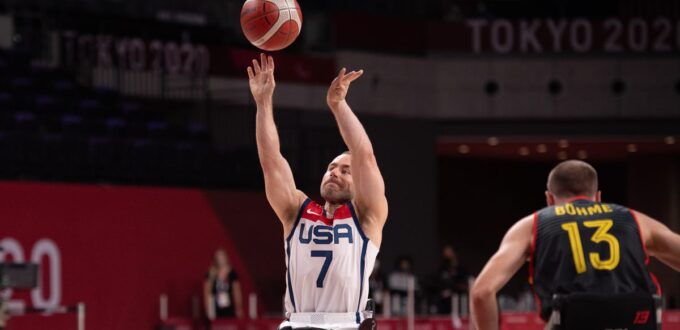
Ryan Neiswender has lived his entire life with a disability, but that hasn’t stopped him from becoming one of the best athletes in his sport today. Now, he wants to change the way society looks at people with disabilities.
“I have people come up to me often and say like, it’s so inspiring that you’re at the gym today,” Neiswender, a Paralympic gold medalist said. “It’s like, well where else would I be? Why’s it inspiring that I’m here?”
He said that it’s like he’s not supposed to be at the gym in other people’s eyes. He believes that thinking comes from aged ideas and uneducated presumptions about what a disabled person is and what they have the ability to do.
“We fight that uphill battle of like, you’re trying to convince people that I’m even a real athlete. That’s like, ridiculous. I train more than like, 90% of Americans at the sport that I do, and I’m really good at it. I’m one of the best players in the world at it.
“The fact that I still have to explain that is a big deal, is what is wrong with the whole situation, I think.”
Lebanon County high school football:Palmyra vs. Lebanon highlights opening night slate
Lebanon City government:Lebanon city officials providing additional training for police after fatal dog shooting
His journey has taken him all over the world and has opened doors to opportunities he’s wanted since he started playing wheelchair basketball.
Now, he’s partnered with a Harrisburg cryptocurrency company to try and educate others on how people are more than their disability with artwork depicting Paralympic athletes, created by disabled artists.
Neiswender, 28, was born and raised in Lebanon. He has congenital distal spinal muscular atrophy, which restricts the ability to use his legs.
He began his athletic journey at a wheelchair basketball clinic in Philadelphia when he was 8 years old.
“I started to just kind of recognize that the things that I knew that I could do in sports, I was actually able to do and could do it really well, because I had the mobility now.”
He described the realization as freeing and fell in love with the sport right out of the clinic.
During high school, he played for a travel team based out of Baltimore where he began to make a name for himself playing both regionally and nationally. That recognition turned into five athletic scholarship opportunities from colleges around the country.
He decided on the University of Illinois, where he played all four years in Division I wheelchair basketball and made All-American four times.
After college, Neiswender played professionally in Germany.
In 2020, Neiswender and team USA won the gold medal in wheelchair basketball at the Tokyo Paralympic games.
He currently lives in Charlotte, North Carolina.
After taking home gold, he was approached by Fantokin, a cryptocurrency startup based out of Harrisburg, to be featured in an NFT collection highlighting Paralympic athletes. The Team Dromos 1.0 collection features four athletes from different Paralympic sports.
Neiswender, who worked for Visa, was familiar with the NFT space before he was approached by Fantokin, and was excited at the prospect.
An NFT is a kind of online token where ownership of an individual asset is recorded on a digital ledger that allows it to be bought, sold and traded online with cryptocurrency.
The Dromos collection went live on Aug. 19 and can be purchased on fantokin.com. Bids for each NFT start at $75, and each has 25 copies.
Neiswender worked closely with both Fantokin and his agent, Ish Tanyeri, to ensure that the collection would send the right message about Paralympians and people with disabilities.
After countless hours of research on the NFT space, Tanyeri found a few articles that described how NFTs had the potential to be used as a place of inclusion and a way for underrepresented people to get their work out.
They both decided that it was important not only to depict disabled athletes, but to have the images created by artists with disabilities as well.
“I really wanted to find the artist that could take this and shape this project for us, and those artists had to be from the community.” Tanyeri said, “Those artists had to have a passion, just like my athletes, a passion for building an awareness and creating inclusive spaces for people with disabilities.”
Tanyeri is the CEO of Dromos Agency, a talent management firm based out of Boston that focuses exclusively on athletes with disabilities.
Tanyeri scoured social media to find artists with disability and worked with several before settling on two disabled artists, Rin Vanderhaeghe and Troy Lindstrom, both from Canada.
“I just don’t think many people have tons of interactions with people with disability. If they do they don’t know what to say, and they quite frankly don’t know what people with disabilities are capable of. So they hesitate to conversate because they don’t want to say the wrong thing,” said Neiswender.
“I think what this does is it opens up the door to say like, there’s disabled people that are artists, there’s disabled athletes, there’s disabled corporate-America Fortune 500 people. Like we’re all around you, and we’re capable of doing amazing things.”
Neiswender is currently preparing for world championships, which take place in Dubai in November, as well as the 2024 Paralympic games in Paris.

No Comments Yet